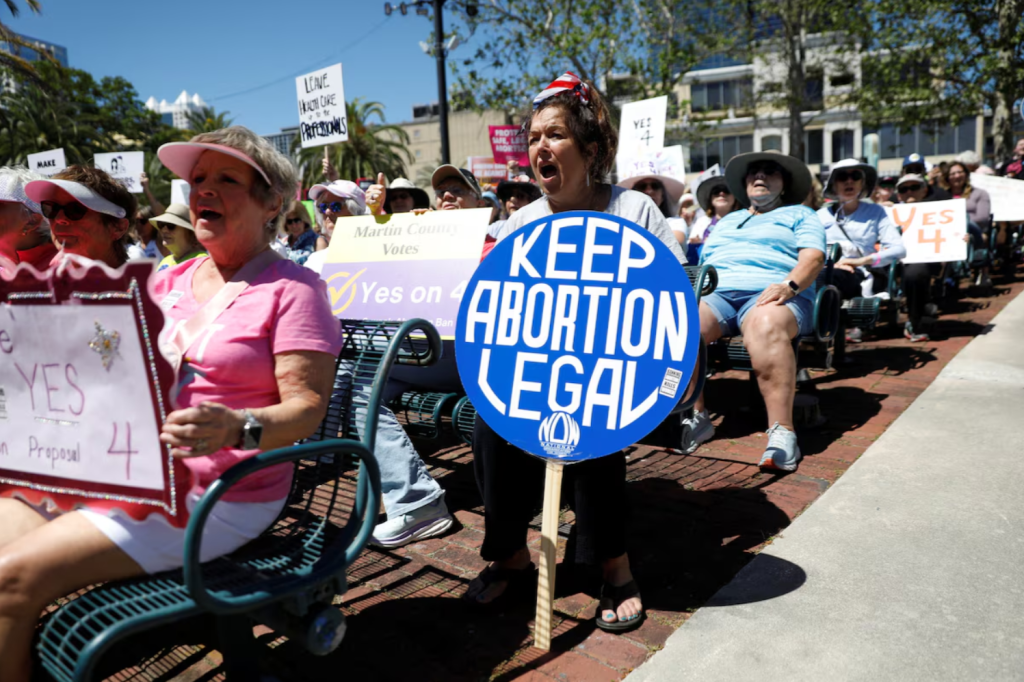
Abortion rights advocates are working to place the issue on ballots in nearly a dozen U.S. states in November’s election, including several expected to play central roles in the presidential race and the battle for control of Congress.
Democratic candidates – fromPresident Joe Bidento members of Congress to state legislators – also are trying to build support for the measures, which they believe will galvanize left-leaning and independent voters.
The list of states includes Arizona, which is likely to be a critical swing state in the presidential contest between Biden and Republican former President Donald Trump and features a competitive Senate race.
Abortion rights will also appear on the ballot in Nevada, where another high-profile Senate election will take place, and Florida, a onetime battleground state that Democrats say could be back in play after its state Supreme Court upheld a six-week ban.
Anger over the U.S. Supreme Court’s decision to eliminate a nationwide right to abortion in 2022 has been widely credited with boosting Democrats’ performance in that year’s midterm elections, as well as in statewide races in Kentucky and Virginia last year.
Since the court ruling, every statewide ballot measure – seven in all – has gone in favor of protecting or expanding abortion access, including in conservative strongholds like Ohio and Kansas.
ARIZONA
Arizona for Abortion Access, a coalition of reproductive rights groups, said it had submitted more than 823,000 signatures to state officials on July 3, more than double the approximately 384,000 needed to put a measure on November’s ballot that would guarantee abortion rights.
The referendum would amend the state constitution to protect abortion rights up to fetal viability, generally around 23 or 24 weeks.
Abortion is expected to play a crucial role in the state’s elections up and down the ballot. In April, the state Supreme Court ruled that an 1864 near-total ban – enacted nearly 50 years before Arizona became a state – could take effect, energizing Democratic voters.
In one high-profile example of how Republicans have struggled to respond, Kari Lake, the Republican candidate for Senate, urged lawmakers to repeal the law, despite having expressed support for the 1864 ban during her unsuccessful gubernatorial run in 2022.
The state legislature did repeal the law weeks after the court ruling, after a handful of Republican lawmakers voted with the Democratic minority. Abortions are now subject to a 15-week ban that Republican lawmakers passed in 2022 after the U.S. Supreme Court decision.
FLORIDA
The state Supreme Court on April 1 approved a ballot measure, backed by reproductive rights groups, asking voters whether to amend the state constitution to protect abortion access.
In a separate ruling, the court upheld the state’s existing 15-week abortion ban, a decision that also cleared the way for a more stringent six-week limit to take effect on May 1.
State Attorney General Ashley Moody, a Republican, had asked the court to block the referendum as misleading and vague, but four of the seven justices – all conservatives – disagreed.
Unlike most states, constitutional amendments in Florida must pass with at least 60% of the vote, a higher threshold of support than any statewide abortion measure has yet received.
Once a perennial battleground state, Florida has leaned Republican in recent elections, voting twice for Trump and electing Governor Ron DeSantis in a landslide in 2022.
Biden’s campaign says it believes he can win Florida following the state Supreme Court’s decisions.
NEVADA
State officials approved a referendum for November asking voters whether to amend the state constitution to protect abortion rights, after a coalition of reproductive rights groups submitted enough valid signatures to qualify the ballot measure.
State law already offers similar protections, but adding them to Nevada’s constitution would make it harder to roll those rights back. Voters would need to approve the measure twice – this year and again in 2026 – to amend the constitution.
Democrats hope the referendum could help boost turnout among their supporters. Nevada is expected to be a battleground state in the presidential contest, while the Senate race between incumbent Democrat Jacky Rosen and Republican challenger Sam Brown is one of the most closely watched of 2024.
OTHER STATES
In Missouri and South Dakota – both deeply conservative states where virtually all abortions have been banned – organizers have submitted petitions to qualify ballot initiatives that would add abortion rights to state constitutions. South Dakota’s secretary of state said on May 16 that her office had validated enough signatures to send the measure to voters, but an opposing group has filed a lawsuit challenging the petitions.
In Arkansas, where abortion is outlawed, and Nebraska, where abortions are largely illegal after 12 weeks of pregnancy, organizers have until July 5 to submit the required number of signatures to qualify ballot measures protecting abortion rights.
A constitutional amendment will also be on the ballot in Colorado and will need 55% support to pass. In Montana, advocates in June submitted nearly twice as many signatures as required for an abortion rights referendum.
Both of those states currently permit abortions, but supporters say adding protections to the state constitutions would ensure lawmakers or courts could not limit abortion rights in the future. While not a presidential battleground, Montana is expected to see a highly competitive U.S. Senate race this year.
There are two states in which lawmakers have approved abortion-related amendments for November’s ballot: New York and Maryland. In both states, abortion is already legal under state law, and the Democratic-controlled legislatures have approved referendums that would amend their state constitutions to add additional protections.